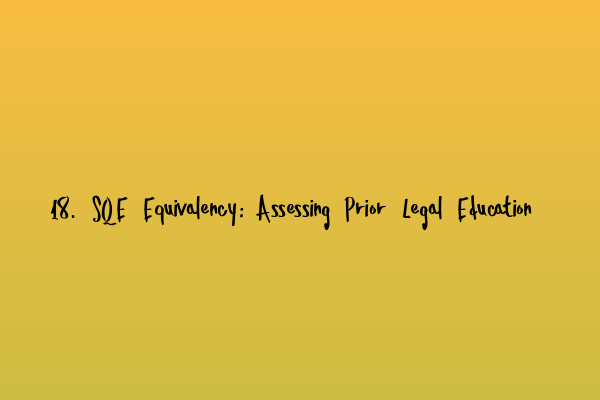18. SQE Equivalency: Assessing Prior Legal Education
For aspiring solicitors, the new Solicitors Qualifying Examination (SQE) offers a simplified path to qualification. With its two stages and comprehensive assessment criteria, the SQE ensures that all candidates are thoroughly tested on their legal knowledge and skills. However, for those who have already completed prior legal education, it is important to understand how their qualifications align with the SQE requirements.
In this article, we will delve into the concept of SQE equivalency and explore how prior legal education is assessed in the context of the SQE. We will provide an overview of the criteria used to evaluate prior education and guidance on how to determine if you meet the equivalency requirements.
Understanding SQE Equivalency
The SQE aims to create a level playing field for all candidates, regardless of their legal background. As such, the Solicitors Regulation Authority (SRA) has established a framework for assessing the equivalency of prior legal education.
Prior to taking the SQE, candidates must undergo an evaluation of their current qualifications, training, and experience. This evaluation serves to determine the extent to which their prior education aligns with the knowledge and competency requirements of the SQE.
Evaluating Prior Legal Education
During the evaluation process, the SRA takes into account several key factors to determine SQE equivalency:
- Content: The content of your prior legal education is assessed to determine if it covers the necessary subjects and skills required by the SQE. This includes a thorough evaluation of the breadth and depth of your legal studies.
- Level: The level at which you completed your prior education is considered. The SRA assesses whether your qualifications align with the academic standards set by the SQE.
- Duration: The duration of your prior education is taken into account to ensure that you have received sufficient training and development in the relevant areas of law.
- Assessment: The assessment methods used in your prior education are examined to determine if they align with the assessment criteria of the SQE. This includes evaluating the rigor and validity of the assessments.
Do You Meet the Equivalency Requirements?
If you have previously completed legal education and are considering taking the SQE, it is important to assess whether you meet the equivalency requirements. To determine this, you should:
- Review the SQE Competency Statement: The SQE Competency Statement outlines the knowledge and skills required to pass the examination. Compare this with the content and level of your prior legal education to identify any gaps.
- Seek Expert Advice: Consulting with a legal education expert or solicitor can provide valuable insights. They can help you assess the equivalency of your qualifications and guide you on any additional preparation you may need.
- Consider Additional Training: If your prior education does not fully align with the SQE requirements, you may need to undertake additional training to bridge the gaps. There are various SQE preparation courses and resources available to help you in this process.
By conducting a thorough evaluation of your prior legal education, seeking expert advice, and considering additional training, you can determine if you meet the equivalency requirements for the SQE. This will ensure that you are adequately prepared for the examination and increase your chances of success.
Conclusion
The SQE provides a more flexible and accessible route to solicitor qualification. For individuals with prior legal education, understanding the concept of SQE equivalency is crucial. By evaluating the content, level, duration, and assessment methods of your prior education, you can determine if you meet the equivalency requirements set by the SRA. Seeking expert advice and considering additional training can also help you bridge any gaps and ensure you are fully prepared for the examination.
Related Articles:
- SQE Strategies: Proven Tactics to Ace the Solicitors Qualifying Examination
- SQE Case Studies: Applying Knowledge in Real-Life Scenarios
- SQE Exam Strategy: Planning and Executing for Optimal Performance
- Solicitors Qualifying Examination (SQE): Your Gateway to Legal Practice
- Mastering Time Management in SQE: Strategies for Efficient Exam Completion
